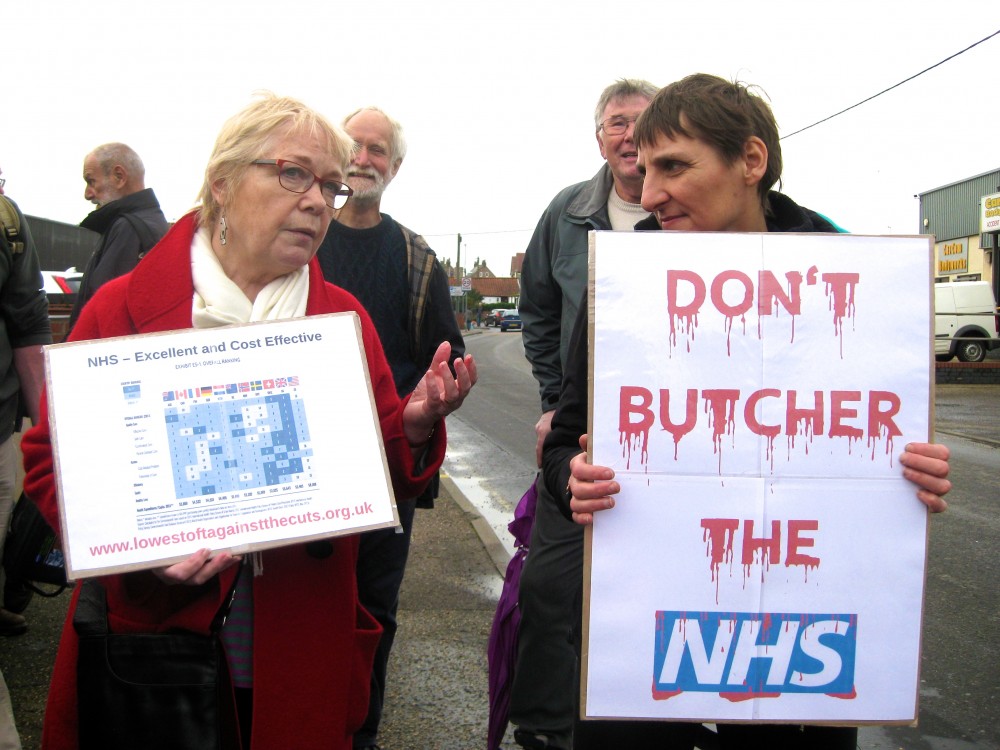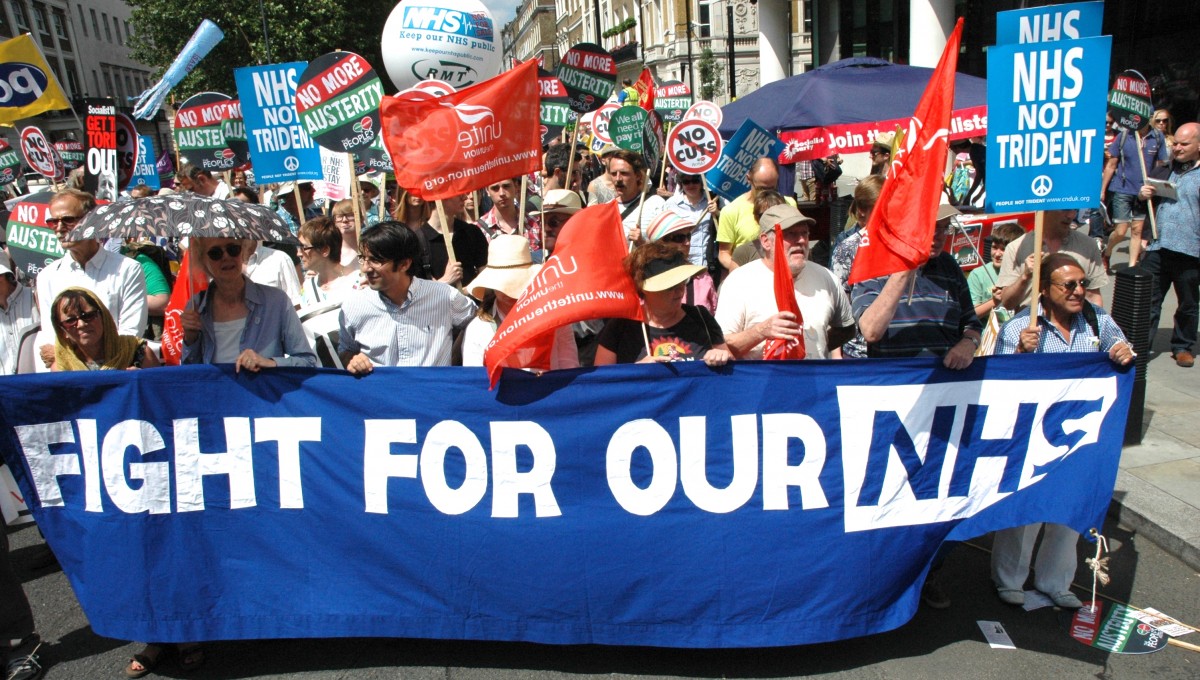
With unbearable stories running through your mind about six-hour waiting times, battling for a seat in a stuffy and overrun waiting room, or being abandoned on a trolley in a dingy corridor waiting for treatment, visiting the accident and emergency (A&E) department of any hospital is something we try and avoid. But when my husband recently attended the A&E department of Stepping Hill Hospital in south Manchester for chest pain, the negative press around the so-called poor performing National Health Service (NHS) emergency departments couldn’t have been further from the truth.
By contrast, he was checked by doctors quickly, underwent meticulous and rigorous tests, was put in an exceptionally efficient, friendly and comfortable cardiac ward, and had, within days, received an operation that saved his life. In short, the treatment my husband received at an NHS hospital beleaguered by cuts, shortages and closures is a commendable example of the admirable work the NHS does, and how much the people of Britain rely on it.
Dismantling a Healthcare System That Works
Stepping Hill Hospital in the south Manchester town of Stockport is the NHS Foundation Trust’s main hospital in the area, which cares for a large population of approximately 350,000 citizens. The hospital first opened in 1905 and is an iconic infirmary feature of the community, boasting a towering maternity unit, one of the busiest emergency departments in the North West (it sees almost 90,000 patients per year), a specialist stroke centre and one of the largest orthopedic services in Britain.
It’s safe to say that virtually everyone living in the vicinity has had ties with the hospital in one way or another. Yet instead of being rewarded for the admirable medical care the hospital has delivered for decades, Stepping Hill is beset with problems, a sorrowful emblem of the country’s deteriorating NHS, which is rapidly running out of money and being forced to operate on the edge of its limits.
The stark reality is that despite its bustling, controlled and embodiment-of-quality-NHS-care façade, Stepping Hill Hospital is operating under intense financial pressure as the U.K. government continues to make billions of pounds’ in cuts to Britain’s health service. Stepping Hill Hospital is currently losing £75 a minute, and in order to offset its huge £40 million deficit, staff have been told it is “essential” to cut costs. Such cost-cutting tactics include the axing of 350 full-time jobs and the closure of a surgical ward – which translates in a loss of 22 beds, including eight trauma and orthopedic beds.
The community has responded to the news with disdain. Stockport Liberal Democrat Councillor Laura Booth, who campaigns for issues affecting hospitals, said: “This is a bolt from the blue and we are desperately worried for the staff and patients who will be affected by these cuts,” Booth told reporters.
The Patients Association, a national healthcare charity that promotes the voice of patients, describes the cuts as “very worrying." The Association's chief executive, Katherine Murphy, posed the question: “Why should patients and NHS staff pay the price for huge NHS wastage over the years and government cuts?”
Protesting to Stop the Cuts
Such is the contempt for the forced cuts on Stepping Hill that last month campaigners gathered outside the hospital to protest against the cuts and raise awareness about the impact such losses will have on the borough’s healthcare. Members from Stockport NHS Watch, a local pressure group, congregated outside the hospital waving banners warning that the forced cuts will put Stepping Hill under great pressure as residents struggle to access services.
Praising the hospital and fearing the burden the cutbacks will create, Raymond Tallis, a retired professor of medicine at Manchester University, told the Manchester Evening News: “We admire the hospital enormously, it is a great hospital. The protest is about a cut in services that is not driven by a reduction in need or demand but by the deficit Stepping Hill has accumulated because of Tory cuts.”
“There will be two effects," Tallis continued. "One, it will be more difficult for patients to get the care they need. And two, the other wards, already under huge pressure, will be more stretched. The things we will see are increased waiting times for operations, more difficulty accessing GPs and increased pressure on A&E. Stepping Hill is being badly treated.”
Parking at Stepping Hill isn’t easy, and if you manage to find a parking spot during busy visiting times, the price of a ticket doesn’t come cheap. Now, in a further blow to both patients and visitors, the already expensive car parking tickets are set to become even costlier – another consequence of the hospital’s ongoing battle to offset its multi-million-pound deficit. Starting Sept. 1, a four-hour stay at the hospital increased from £6 to £8, and a short-stay ticket increased from £2.50 to £3.50.
In a statement smacking with irony, a spokesperson for Stepping Hill attempted to justify the carpark cost increases, telling the BBC: “We fully appreciate that increasing car parking charges will always be unpopular, but it is important we are able to make vital savings in areas which do not affect patient services.”
NHS: Sixty-Eight Years of Tension
The crisis affecting Stepping Hill staff and the Stockport community, which for generations has relied on its quality healthcare, is a disturbing portrayal of the pressure the whole of the NHS is under as it struggles to manage the decline in resources nationwide. The NHS was founded by the Labour government in 1948 under a central principle: to provide a health service that is available to all, financed entirely from taxation. The health secretary at the time, Aneurin Bevan, launched the NHS at Park Hospital in Manchester, the pinnacle of the Labour Party’s ambitious plan to provide quality universal healthcare. It was strongly opposed by the Conservative Party at the time, which voted against the National Health Act.
Despite being considered one of Britain's great national institutions – described by many as the “best of Britain,” for enabling everyone regardless of class or financial status to access quality healthcare – the NHS’s fortunes haven't always been favorable. For decades, government has saddled the institution with pressure, setbacks and debt. Upon taking office in 2010, the Conservative-led coalition government pledged to make £20 billion in NHS cuts by 2015. While dressed up as “efficiency savings,” the cuts proved to have detrimental consequences on the NHS’s frontline services, negatively affecting the healthcare of patients and putting huge pressure on hospitals, clinics and staff.
Under the current Tory government, which came to power in 2015, concerns about the privatization of the NHS have escalated. As NHS duties get increasingly allocated to private firms such as Bupa, Care U.K. and Virgin Care, the private sector has made particular inroads in key NHS services like mental care, community services and general practice. Recent figures from the Department of Health show that the amount of NHS funding going to “independent sector providers” has more than doubled, from £4.1 billion in 2009-10, the last year Labour was in government, to £8.7 billion in 2015-16.
Stepping Hill and other vital NHS hospitals around Britain face intense pressure as they are forced to operate under increasingly limited conditions. But as I personally experienced this summer, Britain’s National Health Service, free and accessible for all, is an institution that government should be fighting to preserve instead of doing its best to destroy.
3 WAYS TO SHOW YOUR SUPPORT
- Log in to post comments















